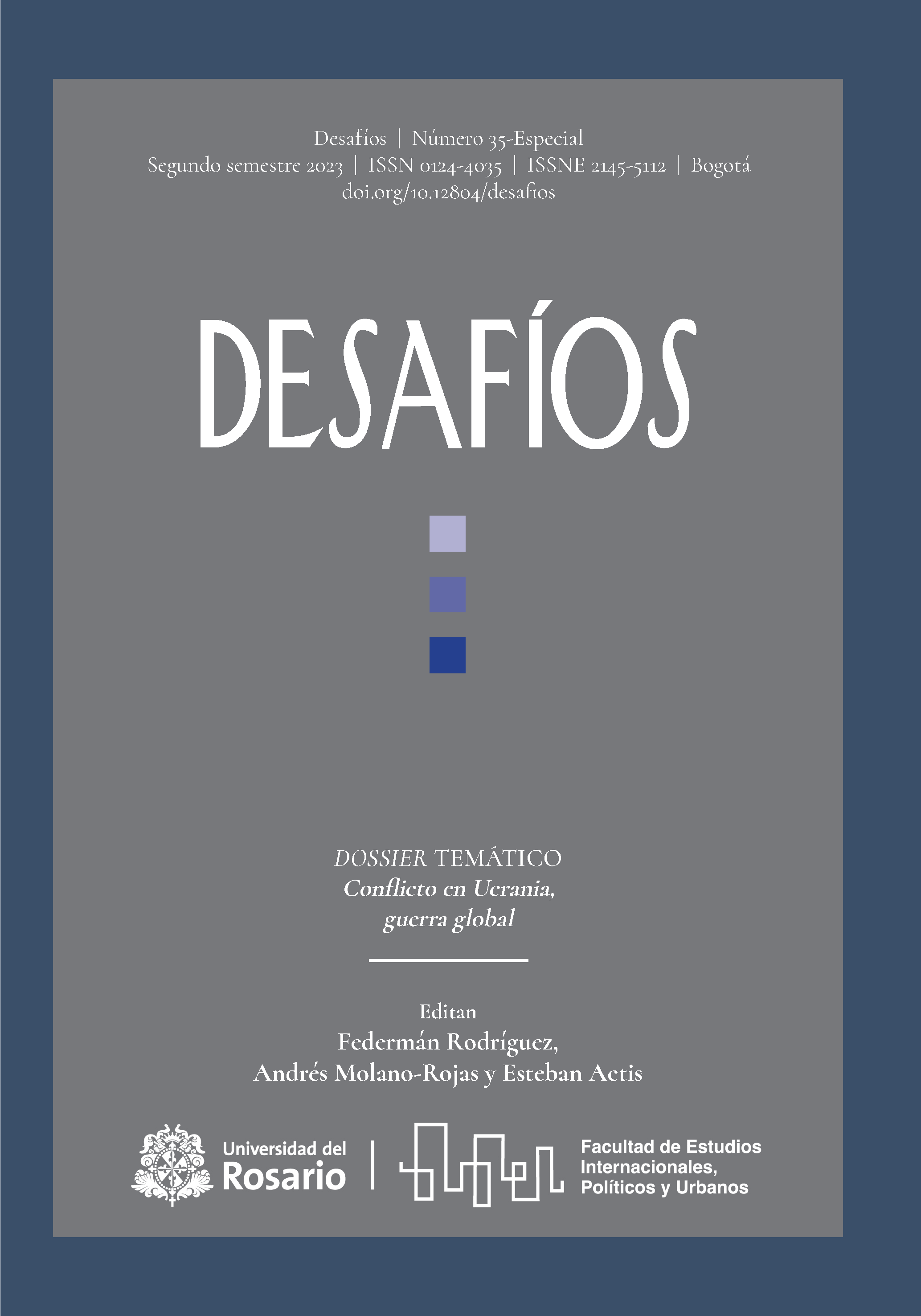El rol actual de la Organización Mundial del Comercio en la gobernanza multilateral del comercio: crisis y continuidades
Barra lateral del artículo
Contenido principal del artículo
El objetivo es hacer un análisis sistémico de la Organización Mundial del Comercio (OMC) en medio de la crisis por la que esta atraviesa. Se sostiene que la OMC, si bien pasa por una crisis profunda en términos reales y simbólicos, sigue cumpliendo un rol importante en la crecientemente compleja gobernanza multilateral. Para eso, se analizan las tres funciones principales que cumple en la gobernanza multilateral del comercio: ser un foro de negociaciones comerciales, brindar un sistema eficiente de solución de disputas y ser una arena de discusión y revisión de estándares mínimos de política comercial. El artículo está dividido en tres partes. Primero, se analizan las propuestas de reforma de la OMC y los temas en los cuales han avanzado en años recientes. Segundo, el desempeño del sistema de solución de controversias y en conjunto con la revisión del debate sobre su reforma. Tercero, el desempeño del mecanismo de examen de políticas comerciales. La metodología es cualitativa, con revisión de la literatura especializada y análisis de fuentes primarias (documentos oficiales de la OMC), comunicados de países miembro, declaraciones conjuntas, informes de órganos y comisiones, además de recolección y análisis de datos disponibles en la página web de la organización.
Descargas
Bown, C., & Keynes, S. (2020). Why did Trump end the wto’s appellate body? Tariffs. Petterson Institute for International Economics (piie). https://www.piie.com/blogs/trade-and-investment-policy-watch/why-did-trump-end-wtos-appellate-body-tariffs
Chaisse, J., & Matsushita, M. (2013). Maintaining the wto’s supremacy in the International Trade Order: A proposal to refine and revise the role of the trade policy review mechanism. Journal of International Economic Law, 16(1), 9-36. https://doi.org/10.1093/jiel/jgs043
Comisión Económica para América Latina y el Caribe (Cepal). (2008). Guía práctica
de solución de diferencias en la omc. https://www.cepal.org/sites/default/files/publication/files/3637/S2008846_es.pdf
Francois, J. F. (1999). Maximizing the benefits of the trade policy review mechanism for developing countries. Tinbergen Institute & cepr. https://citeseerx.ist.psu.edu/document?repid=rep1&type=pdf&doi=3419396f1955715ee5bf3ca3840165072a5b848d
Gao, H. (2021). Finding a Rule-based solution to the appellate body crisis: Looking beyond the multiparty interim appeal arbitration arrangement. Journal of International Economic Law, 24(3), 534-550. https://doi.org/10.1093/jiel/jgab031
Geneva Trade Pattlaform. (s. f.). Multi-Party interim appeal arbitration arrangement (mpia). https://wtoplurilaterals.info/plural_initiative/the-mpia/
Heidrich, P., & Peixoto, J. (2019, abril). Multilateral trade institution in peril: Re-assessing the value of the wto as a public good [ponencia]. International Research Seed Grant Award, Universidad de Carleton/Canadá, Abril.
Hoekman, B. (2020). wto reform priorities post-covid-19. East Asian Economic Review, 24(4), 337-348. https://dx.doi.org/10.11644/kiep.eaer.2020.24.4.383
Hoekman, B. M., & Mavroidis, P. C. (2015). wto ‘à la Carte’or ‘Menu du Jour’? Assessing the case for more plurilateral agreements. European Journal of International Law, 26(2), 319-343. https://doi.org/10.1093/ejil/chv025
Hoekman, B. M., & Mavroidis, P. C. (2021). wto reform: Back to the past to build for the future. Global Policy, 12, 5-12. https://doi.org/10.1111/1758-5899.12924
Hoekman, B., & Sabel, C. (2019). Open plurilateral agreements, international regulatory cooperation and the wto. Global Policy, 10(3), 297-312. https://doi.org/10.1111/1758-5899.12694
Hoekman, B., & Sabel, C. (2021). Plurilateral cooperation as an alternative to trade agreements: Innovating one domain at a time. Global Policy, 12, 49-60. https://doi.org/10.1111/1758-5899.12923
Hoekman, B., & Wolfe, R. (2021). Reforming the World Trade Organization: Practitioner perspectives from China, the eu, and the us. China & World Economy, 29(4), 1-34. https://doi.org/10.1111/cwe.12378
Karlas, J., & Parízek, M. (2019a). Supply of policy information in the World Trade Organization: Cross-national compliance with one-time and regular notification obligations, 1995-2014. World Trade Review, 1-21. https://doi:10.1017/S1474745618000393
Karlas, J., & Parízek, M. (2019b). The process performance of the wto trade policy review mechanism: Peer‐reviewing reconsidered. Global Policy, 1-9. https://doi:10.1111/1758-5899.12672
Keohane, R. O. (1988). Después de la hegemonía: Cooperación y discordia en la política económica mundial. Grupo Editor Latinoamericano.
Keohane, R., Moravcsik, A., & Slaugther, A. M. (2000). Legalized dispute resolution: Interstate and transnational. International Organization, 54(3), 457-488.
Kucik, J., Peritz, L., & Puig, S. (2023). Legalization and compliance: How judicial activity undercuts the global trade regime. British Journal of Political Science, 53(1), 221-238. https://doi.org/10.1017/S0007123422000163
Laird, S., & Valdés, R. (2012). The trade policy review mechanism. En M. Daunton, A. Narlikar, & R. M. Stern (Eds.), The Oxford handbook on The World Trade Organization (pp. 463-484). Oxford Academic. https://doi.org/10.1093/oxfordhb/9780199586103.013.0022
Lang, A. (2011). World trade law after neoliberalism: Reimagining the global economic order. Oxford University Press.
Lester, S. (2020). Can interim appeal arbitration preserve the wto dispute system? Free Trade Bulletin, 77. https://www.cato.org/free-trade-bulletin/can-interim-appeal-arbitration-preserve-wto-dispute-system
Mavroidis, P. (2012). Free lunches? wto as public good, and the wto’s view of public goods. European Journal of International Law, 23(3), 731-742. https://doi.org/10.1093/ejil/chs055
McDougall, R. (2017). Search for solutions to save the wto appellate body. European Centre for International Political Economy. http://ecipe.org//app/uploads/2017/12/Bulletin-03.17.pdf
McDougall, R. (2018). Crisis in the wto: Restoring the wto dispute settlement function. Center for International Governance Innovation (cigi). https://www.cigionline.org/static/documents/documents/Paper%20no.194.pdf
Narlikar, A. (2022). How not to negotiate: The case of trade multilateralism. International Affairs, 98(5), 1553-1573. https://academic.oup.com/ia/article/98/5/1553/6686642
Organización Mundial del Comercio (omc). (2018). Procedimientos para aumentar la transparencia y fortalecer las prescripciones en materia de notificación previstas en los acuerdos de la omc. job/gc/204.
https://docs.wto.org/dol2fe/Pages/ss/directdoc.aspx?filename=s:/Jobs/gc/204.pdf&Open=True
Organización Mundial del Comercio (omc). (2022a, 28 de abril). Procedimientos para aumentar la transparencia y mejorar el cumplimiento de las prescripciones en materia de notificación previstas en los acuerdos de la omc. job/gc/204/Rev.9. https://docs.wto.org/dol2fe/Pages/ss/directdoc.aspx?filename=s:/Jobs/gc/204R9.pdf&Open=True
Organización Mundial del Comercio (omc). (2022b, 5 de diciembre). Informe del órgano de examen de las políticas comerciales para 2022: Mecanismo de examen de las políticas comerciales. wt/tpr/488. https://docs.wto.org/dol2fe/Pages/ss/directdoc.aspx?filename=s:/wt/tpr/488.pdf&Open=True
Organización Mundial del Comercio (omc) (s. f.). Mecanismo de examen de las políticas comerciales (“mepc”). https://www.wto.org/spanish/tratop_s/tpr_s/annex3_s.htm#fnt-1
Organización Mundial del Comercio (omc). (s. f.a). Iniciativas conjuntas. https://www.wto.org/spanish/tratop_s/jsi_s/jsi_s.htm
Organización Mundial del Comercio (omc). (s. f.b). Iniciativa conjunta sobre la Reglamentación Nacional en el ámbito de los Servicios. https://www.wto.org/spanish/tratop_s/serv_s/jsdomreg_s.htm#ftnte
Pauwelyn, J. (2019). wto dispute settlement post 2019: What to expect? Journal of International Economic Law, 22(3), 297-321.
Pauwelyn, J. (2023). The wto’s multi-party interim appeal arbitration arrangement (mpia): What’s new? World Trade Review, 1-9. https://doi.org/10.1017/S1474745623000204
Payosova, T., Hufbauer, G. C., & Schott, J. J. (2018). The dispute settlement crisis in the World Trade Organization: Causes and cures. piie Policy Brief, 18(5). https://piie.com/publications/policy-briefs/dispute-settlement-crisisworld-trade-organization-causes-and-cures
Peixoto Batista, J. P. (2010). Flexibilities for developing countries in the Doha round as À La Carte special and differential treatment: Retracing the Uruguay steps. Brazilian Journal of Latin American Studies, 9(16), 164-191. http://www.usp.br/prolam/downloads/2010_1_9.pdf
Peixoto Batista, J. P. (2016). Armonización y fragmentación de las reglas en el sistema internacional: Un acercamiento al caso de la omc. Revista Relaciones Internacionales, 25(50), 45-74. https://revistas.unlp.edu.ar/rrii-iri/article/view/2683
Peixoto Batista, J. P. (2018). El constitucionalismo internacional y el caso de los protocolos de adhesión de la Organización Mundial de Comercio. Revista Cuestiones Constitucionales, 38(1), 168-197. https://doi.org/10.22201/iij.24484881e.2018.38
Plummer, M. G., & Tafti, A. (2014). Transparency in international trade policy. En J. Forssbaeck & L. Oxelheim (Eds.), The Oxford handbook of economic and institutional transparency (pp. 166-178). Oxford University Press. https://doi.org/10.1093/oxfordhb/9780199917693.013.0007
Primo Braga, C. A., & Hoekman, B. (Eds.). (2017). Future of the Global Trade Order (2.ª ed.,
pp. 117-146). European University Institute.
Real Academia Española. (2023). Diccionario panhispánico de español jurídico. https://www.dpej.rae.es
Sacerdoti, G. (2017). The future of the wto dispute settlement system: Confronting challenges to consolidate a success story. En C. A. Primo Braga & B. Hoekman (Eds.), Future of the global trade order (2.ª ed., pp. 117-146). European University
Institute. https://doi.org/10.2870/169287
Sinha, A. (2021). Understanding the “crisis of the institution” in the liberal trade order at the wto. International Affairs, 97(5), 1521-1540. https://doi.org/10.1093/ia/iiab109
Soobramanien, T. Y., & Vickers, B. (2019). Reshaping the wto: Some reflections on a way forward. wto Reform: Reshaping Global Trade Governance for 21st Century Challenges. En T. Soobramanien, B. Vickers, & H. Enos-Edu (Eds.), wto Reform: Reshaping global trade governance for 21st century challenges (pp. 77-88). Commonwealth Secretariat. https://doi.org/10.14217/00e90b64-en
Stasavage, D. (2004). Open-door or closed-door? Transparency in domestic and international bargaining. International Organization, 58(4), 667-703. https://doi.org/10.1017/S0020818304040214
Sutherland, P., Bhagwati, J., Botchwey, K., FizGerald, N., Hamada, K., Jackson, J. H., Lafer, C., & Montbrial, T. de. (2005). El futuro de la omc: Una respuesta a los desa fíos institucionales del nuevo milenio. Organización Mundial del Comercio. https://www.wto.org/spanish/thewto_s/10anniv_s/future_wto_s.htm
Tempone, E. (2007). Los dilemas institucionales de la omc: Comentarios sobre el “Informe Sutherland”. Agenda Internacional, 14(25), 181-199. https://dialnet.unirioja.es/servlet/articulo?codigo=6302562
Tussie, D., & Peixoto Batista, J. (2010). Tomorrow never dies? El colapso de Doha y lecciones de la historia. Cadernos Adenauer, 9(3), 101-112. Ungphakorn, P. (2022a, 27 de julio). “Notification and review” sounds dull but is essential for wto reform. Trade β Blog: Reflections on Trade and More. https://tradebetablog.wordpress.com/2022/07/18/notification-review-essential-wto-reform/#transparency
Ungphakorn, P. (2022b, 7 de agosto). Texts: Wto reform proposals on enhancing transparency and review. Trade β Blog: Reflections on Trade and More. https://tradebetablog.wordpress.com/proposal-wto-reform-transparency-review/
Ungphakorn, P. (2023a, 9 de febrero). Experts: India, S. Africa unlikely to succeed in blocking wto services deal. Trade β Blog: Reflections on Trade and More. https://tradebetablog.wordpress.com/2023/02/07/india-s-africa-unlikely-succeed-services/#more-21631
Ungphakorn, P. (2023b, 11 de febrero). Explainer: The 18 wto Plurilaterals and “Joint-Statement Initiatives”. Trade β Blog: Reflections on Trade and More. https://tradebetablog.wordpress.com/2022/01/03/17-wto-plurilaterals-joint-statement/
Wilkinson, R. (2017). Back to the future: “Retro” trade governance and the future of the multilateral order. International Affairs, 93(5), 1131-1147. https://doi.org/10.1093/ia/iix158
World Trade Organization. (2019, 27 de febrero). DG Azevêdo: “The time is now to confront systemic challenges”. https://www.wto.org/english/news_e/news19_e/dgra_27feb19_e.htm
Wolfe, R. (2013). Letting the sun shine in at the wto: How Transparency brings the trading system to life. World Trade Organization. http://dx.doi.org/10.30875/1ddcf17f-en
Zelicovich, J. (2019). La crisis de la omc y el trilema de las negociaciones comerciales internacionales. Revista Relaciones Internacionales, 92(1), 1-21. https://doi.org/10.15359/ri.92-1.1
Zelicovich, J. (2020). Hacia una nueva reforma de la Organización Mundial de Comercio: Análisis de su proceso de posicionamiento en la agenda internacional reciente. Revista Relaciones Internacionales, Estrategia y Seguridad, 15(1), 43-60. https://doi.org/10.18359/ries.4014
Detalles del artículo

Esta obra está bajo una licencia internacional Creative Commons Atribución-NoComercial 4.0.
Los derechos de autor serán de la Universidad del Rosario. Cuando el autor quiera publicar el manuscrito en otra publicación, deberá pedir a la Editorial de la Universidad del Rosario los permisos correspondientes. De igual forma, cuando la Revista esté interesada en publicar artículos que ya han sido publicados en otras revistas, procederá a solicitar los permisos correspondientes en la editorial donde se realizó la primera publicación. Bajo una Creative Commons Attribution License, los autores pueden compartir el trabajo con un reconocimiento de la autoría del trabajo y la publicación inicial en esta revista.Artículos más leídos del mismo autor/a
- Juliana Peixoto Batista, Daniela Vanesa Perrotta, El Mercosur en el nuevo escenario político regional: más allá de la coyuntura , Desafíos: Vol. 30 Núm. 1 (2018): (enero-junio) Procesos de regionalización: nuevas y antiguas perspectivas




